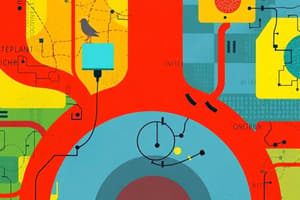Podcast
Questions and Answers
What historical event marked the beginning of German radio?
What historical event marked the beginning of German radio?
- The appearance of the first newspapers in the 16th century
- The small Christmas concert sent from Königs Wusterhausen (correct)
- The first regular newspaper in Strasbourg
- The invention of printing with movable types in Mainz
What was a common concern about the widespread availability of books?
What was a common concern about the widespread availability of books?
- Encouraging critical thinking
- Promoting intellectual curiosity
- Threatening the power of rulers (correct)
- Improving literacy rates
Who is credited with inventing printing with movable types?
Who is credited with inventing printing with movable types?
- Gutenberg (correct)
- Berlin
- Bi Sheng
- Strasbourg
What was one of the concerns about the new medium of radio?
What was one of the concerns about the new medium of radio?
Where did the first regular newspaper, 'Die Relation,' come out?
Where did the first regular newspaper, 'Die Relation,' come out?
What practice predates Gutenberg's invention of printing with movable types?
What practice predates Gutenberg's invention of printing with movable types?
What was the term 'Fama' used for in relation to newspapers?
What was the term 'Fama' used for in relation to newspapers?
When were the first movie theaters opened?
When were the first movie theaters opened?
How were silent films accompanied?
How were silent films accompanied?
Who invented the Nipkow disk in 1884, which served as the foundation for television?
Who invented the Nipkow disk in 1884, which served as the foundation for television?
When did Google launch?
When did Google launch?
What percentage of the global population was using the internet by 2020?
What percentage of the global population was using the internet by 2020?
What emerged in the late 2000s as social media platforms?
What emerged in the late 2000s as social media platforms?
What are some concerns raised about social media?
What are some concerns raised about social media?
What do critics argue about the internet?
What do critics argue about the internet?
What does text state about television broadcasting in the 1950s?
What does text state about television broadcasting in the 1950s?
Flashcards are hidden until you start studying
Study Notes
- It's December 22, 1920, from the main broadcasting station in Königs Wusterhausen near Berlin.
- They announce they'll send a small, humble Christmas concert to mark the station's maturity.
- The tone is recorded using a special lightning conductor transmitter, a sound of the 1920s.
- This marks the beginning of German radio, a significant milestone in history.
- Not everyone was thrilled about this new medium. Some argued it would lead to intellectual laziness or information overload.
- Media history: Gutenberg invented printing with movable types in Mainz, Germany, in 1450. The printing press principle predates him from China's Bi Sheng in the 11th century but was popularized by Gutenberg.
- The specialty of Gutenberg's invention is the mass production of texts with less effort compared to hand-copied books. By the 16th century, 100,000 titles were printed in the German-speaking region alone.
- The widespread availability of books led to criticism as some feared people would be overwhelmed by knowledge, potentially threatening the power of the rulers.
- Around the same time, the first newspapers appeared in the 16th century. They were sold at marketplaces and offered news on recent events since the last market day.
- The first regular newspaper, "Die Relation," came out in 1605 in Strasbourg, providing European news weekly.
- People needed to trust the newspaper's accuracy, yet there were fewer other sources to cross-check information against compared to today.
- The term "Fama" was used for newspapers, referring to both fame and gossip.
- The rise of newspapers contributed to the formation of a public sphere, including the nobility down to peasants.
- The Lumière brothers showed the first movie in Paris, 1895, using a movie projector and camera combined. They weren't the only film inventors, but they were the most successful in marketing it.
- In 1896, the first movie theaters opened in German metropolises.
- Early films covered various topics, from everyday life to wars and adventures.
- The silent films were accompanied by live music or orchestras and audience commentary.
- Some warned against health risks like eye strain, while others saw it as a valuable source of education, particularly for the lower classes.- The development of television is compared to the printing press by contemporary observers.
- Paul Nikolaus, an Ostpreussian technician, invents the Nipkow disk in 1884, which serves as the foundation for television.
- Television development starts in the 19th century and gathers momentum in the 1930s with experimentation.
- In 1952, both the German Democratic Republic and the Federal Republic of Germany launch their first television news programs.
- Initially, TV broadcasting only lasts for a few hours each day.
- In response to concerns about the potential negative health effects of prolonged television viewing, Werner Pleister, the first German television intendant, proposes limiting television programming.
- Despite this, the television industry and broadcasters push for round-the-clock television, driven by the desire to sell more televisions and attract more viewers.
- In the 1950s, television becomes a popular medium, with sporting events and royal coronations among the most-watched programs.
- The foundations for the internet are laid in the 1950s and 1960s, and Google launches in 1997, making the internet an integral part of modern life.
- By 2020, 94% of the global population is using the internet.
- Social media platforms like Myspace, YouTube, and Flickr emerge in the late 2000s, followed by messaging apps like WhatsApp and Facebook.
- Social media allows people to connect with one another around the world, but also raises concerns about privacy, addiction, and the negative effects of online communication.
- Critics argue that the internet can lead to a loss of community, make people more shallow, and contribute to the spread of fake news and conspiracy theories.
- Despite these concerns, the internet continues to grow in popularity and impact, shaping the way we communicate, learn, and live.
- The history of media teaches us that successful media enable participation and provide knowledge and networking opportunities, but also require criticism and healthy engagement.
- The arguments against media often revolve around health effects, the potential misuse of reach, and the content being disseminated.
- As media and its capabilities become more accepted, criticism can be overlooked, making media education and literacy increasingly important.
- What do you think about the internet? What is good about it? What is bad? Should media be more regulated? Share your thoughts in the comments. I would also recommend the Terra X plus channel for digital learning, where you can find educational material on various topics, including school subjects like biology and geography. Enjoy your viewing!
Studying That Suits You
Use AI to generate personalized quizzes and flashcards to suit your learning preferences.




